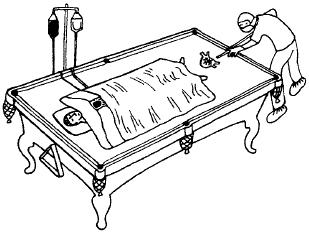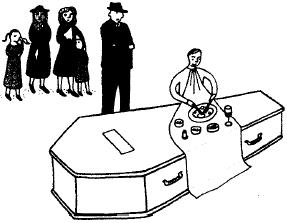
God cures the patient and the doctor pockets the fee
We have all kinds of habits that aren’t exactly good for us. As the Italian proverb cheerily goes: ‘Bacco, tabacco e Venere, riducon l’uomo in cenere’, Bacchus, tobacco and Venus make men into ashes:
Glimmstengel (German) a cigarette (literally, a glowing stick)
pitillo (Spanish) a cigarette (literally, a small whistle)
bychkovat’ (Russian) to smoke only part of a cigarette so as to save the butt
sassakisibingweiabas (Ojibway, North America) feeling a burning pain in my eyes from too much smoke
The simplest symptoms can announce forthcoming suffering:
hí (Rapanui, Easter Island) to have a headache or to blow one’s nose
kirukiruppu (Tamil) dizziness
cloch (Scots) to cough frequently and feebly
koodho (Anywa, Nilo-Saharan) to fart repeatedly
ku-susuukirira (Ganda, Uganda) to feel the first shivers of a fever
svimfardig (Swedish) ready to faint
motami-ella (Yamana, Chile) to go home or to a place eastwards and throw up
Some people are more likely to succumb to illness than others:
niba n aoraki (Gilbertese, Oceania) a person very susceptible to catching every disease
mabuk darah (Malay) one who becomes sick upon seeing blood
wakakhtakeća (Dakota, USA) one who is made sick by a little matter, one who is nervous
aráttam (Tamil) the anxiety of a sick person
Love is often described using the terminology of disease, as with dongai (Fijian) love sickness; while sex is seen both as a cause of sickness and as a cure:
pham-phòng (Vietnamese) to become sick after having intercourse
una cachiaspirina (Chilean Spanish) refers to how one will sweat heavily during sex and thus kill a cold
All too soon things become more serious:
zweet peentjes (Dutch) sweating like a pig (literally, sweating carrots)
fare i gattini (Italian) to vomit (literally, to make the kittens)
ca-ca-ca (Tsonga, South Africa) to have diarrhoea; to rain heavily
sarar burer (Chorti, Guatemala) a fever accompanied by an itch
útsu (Telugu, India) the falling out of the hair from sickness
oka/shete (Ndonga, Namibia) urination difficulties caused by eating frogs before the rain has duly fallen
kinudegan (Maguindanaon, Philippines) a disease in men that causes the penis to retract inside the body
Routine must be interrupted and steps must be taken:
krankfeiern (German) to call in sick (literally, to celebrate illness)
tombola (Kalanga, Botswana) to extract a thorn from flesh using a safety pin
tervismuda (Estonian) curative mud
verkwakzalveren (Dutch) to spend money on quack remedies
kudóripannugirathu (Tamil) to slit or cut the top of the head in order to put in medicine to cure dangerous diseases
Few enjoy handing themselves over to doctors, but sometimes it’s unavoidable; or, as they say in France, inévitable:
trente-trois say ah! (literally, thirty-three – said by a doctor to the patient)
artilleur de la pièce humide a male nurse (literally, artil-leryman of the wet gun)
passer sur le billard to undergo surgery (literally, to go onto the billiard table)

In some societies recommended cures may not be primarily medical:
millu (Quechuan, Andes) a rock of aluminium sulphate used by witch doctors, who diagnose illnesses by analysing its colour change when it is thrown into a fire
ti-luoiny (Car, Nicobar Islands) to call on the spirit of a sick man to return
tawák (Tagalog, Philippines) a quack doctor with magic saliva
anavinakárayá (Sinhala, Sri Lanka) a juggler, one who practises incantations upon persons who have been poisoned or bitten by a serpent
indahli (Alabama, USA) to cut stripe marks on, in order to suck out blood (applied to a hexed or sick person)
A chilote Indian, who has gathered up the spittle of an enemy, will put it in a potato, hang it in the smoke, and utter certain spells in the belief that his enemy will waste away as the potato dries in the smoke. And many others, likewise, believe that one person can be responsible for another’s physical decline:
khmungha (Dakota, USA) to cause sickness or death in a supernatural way
If it’s an evil spirit to blame, it will need to be expelled. Methods differ:
tin-fu-ko (Car, Nicobar Islands) the driving out of the devil from a man by beating the ground with the thick stubs of a coconut leaf
sosela (Tsonga, South Africa) to cure a person by exorcism through the beating of drums
phurbu (Tibetan) ceremonial nails with which evil demons are symbolically nailed fast and banished
The Koreans, Japanese and Chinese (both in Cantonese and Mandarin) avoid the number 4 since in all these languages it has a very similar pronunciation to the word for death. Chinese and Korean buildings often do not have a fourth floor, replacing the number 4 (sa) with the letter F. This is not the only number that the Chinese are wary of: the number 1414 is especially avoided because when spoken it sounds just like the words ‘definite death, definite death’. Many traditional Chinese people believe that having an uneven number of people in a photograph brings bad luck. To have three people is of greater consequence as the person in the middle will die.
With luck, however outlandish it is, the cure will work and time will do the rest:
mimai (Japanese) to visit a sick person in the hospital
hletela (Tsonga, South Africa) to help a sick person to walk; to lead, as a hen does her chickens
samaya (Maguindanaon, Philippines) a party held to celebrate the promised cure for someone who is sick
insobáayli (Alabama, USA) to have the feeling come back to a body part
amūlha-vinaya (Pali, India) an acquittal on the grounds of restored sanity
But nothing can ever be taken for granted:
doi (Vietnamese) to make one’s last recommendations before death
urdhwaswása (Sinhala, Sri Lanka) the rattling in the throat which precedes death
agonia (Spanish) the dying breath
sa-soa (Bakweri, Cameroon) a comb; to make deathbed state-ments as to the disposition of property
We kick the bucket or turn up our toes. The Russians play the snake, throw their hooves outwards, glue up their slippers, or throw out their best skates. The theme of no longer being shod and upright on your feet is widespread…
estirar la pata (Latin American Spanish) to stretch out your leg
colgar los tenis (Mexican Spanish) to hang up or hand in your tennis shoes
at stille traeskoene (Danish) to put aside the clogs
zaklepat bačkorama (Czech) to bang together a pair of slippers
oikaista koipensa (Finnish) to straighten one’s shanks
nallari havaya dikmek (Turkish) to raise horse shoes to the sky
… but not exclusive:
gaan bokveld toe (Afrikaans) to go to the goat field
cerrar el paraguas (Costa Rican Spanish) to close the umbrella
liar el petate (Spanish) to roll up the sleeping mat
passer l’arme a gauche (French) to pass the firearm to the left
ins Gras beißen (German) to bite into the grass
a da coltul (Romanian) to turn around the corner
hälsa hem (Swedish) to send home one’s regards
irse al patio de los callados (Chilean Spanish) to go to the courtyard of the hushed
ya kwanta dama (Hausa, Nigeria) he is lying on his right arm (Muslims are buried not lying on their backs but on the right arm facing the Kaabah)
To die of an illness is not ideal, but in comfortable surroundings, with loved ones around us, perhaps better than some of the alternatives:
lepur (Malay) to die through suffocation in mud
asa (Korean) death from starvation
áhano’xéohtsé (Cheyenne, USA) to die from carrying a load
skeelah (Hebrew) stoning to death
lang-trÌ (Vietnamese) death by a thousand cuts (an ancient punishment)
prayopaveshī (Hindi) one who undertakes a fast unto death
chǒngsa (Korean) love suicide, double suicide
fwa imfwa leza (Mambwe, Zambia) to die abandoned and alone (without having anyone to fold one’s arms and legs for the burial)
lavu (Manobo, Philippines) to drown someone by overturning their canoe
The Fore tribe of New Guinea suffer from a terrible disease called kuru, which means shaking death. It is also known as the laughing sickness from the disease’s second stage in which the sufferers laugh uncontrollably. It has a 100 per cent fatality rate.
There’s no saving us now; the best we can hope for is a little dignity:
tlanyi (Tsonga, South Africa) to find a person lying dead when one thought him alive
bahk’ e chamen (Chorti, Guatemala) the fright caused by looking at a corpse
kreng (Dutch) a dead body which is bloated from being sub-merged in water for a substantial period of time (also a bitch)
gruz 200 (Russian) corpses transported by air (literally, load 200)
arm (Estonian) scar
cocoa (Nahuatl, Mexico) to suffer pain
halal (Hungarian) death
kill (Amharic, Ethiopia) skull
kiss (Swedish) pee
men (Thai) a bad smell
rib (Somali) contraction
rat (Romani) blood
safari (Zarma, Nigeria) medicine
wish (Bashgali, India) poison; medicine
Every culture attaches importance to a respectful disposal of the dead; but how exactly they do it is different all over:
vynosit’ (Russian) to bury someone (literally, to carry some-one out feet first)
monoklautos (Ancient Greek) with one mourner
tomboka (Luvale, Zambia) to dance (said of an executioner)
sahagamanamu (Telugu, India) the burning alive of a widow, with her dead husband
Leichenschmaus (German) the meal after the funeral (literally, corpse banquet)

xuxo (Tsonga, South Africa) the spot where an important man died; when rites are observed for his spirit, people go first to that place, then to his grave
‘A beautiful funeral does not necessarily lead to paradise,’ runs a Creole proverb and, were we still able to care, such a thought might be reassuring:
tumeakana (Yamana, Chile) to not show the grief for a friend who has died that is expected from relatives, to act when a mourner as though one was not a mourner
pesamenteiro (Portuguese) one who habitually joins groups of mourners at the home of a deceased person, ostensibly to offer condolences but in reality to partake of the refreshments which he expects will be served
Now all that’s left is for those who remain to remember and express their feelings:
di-huong (Vietnamese) the memory of a dead lover
keriah (Hebrew) a tear in clothes to signify a broken heart
miàti-drànomàso (Malagasy, Madagascar) to go up to the palace to weep on the decease of the sovereign
nyekar (Indonesian) to visit and lay flowers on the grave of a dead relative or friend
prātahsmaranīya (Hindi) worthy of being remembered every morning; revered
yortsayt (Yiddish) the anniversary of someone’s death
While some love and remember, there are others who believe that if someone is ill and dies there must be someone to blame; and appropriate action may have to be taken:
rihehlo (Tsonga, South Africa) a spell cast upon a person by putting medicines on the grave of one killed by his witchcraft
Once under the ground we say we are ‘pushing up daisies’. For the French, though, to be dead and buried is either engraisser les asticots, fattening the maggots, or manger les pissenlits par la racine, eating dandelions by the roots. Even more imaginatively the Germans have sich die Radieschen von unten angucken, he’s looking at the radishes from below.
min taht al dalf lataht al mizrab (Arabic) from under the drip to under the spout
dostat se z bláta do louie (Czech) out of the mud into the puddle
aasmaan se gire khajoor mein atke (Hindi) down from the skies into the date tree
takut akan lumpur lari ke duri (Indonesian) afraid of mud, escape to thorns
sudah jatuh tertimpa tangga pula (Indonesian) already fallen and hit by the stairs as well
lepas dari mulut harimau masuk ke mulut buaya (Indonesian) freed from the tiger’s mouth to enter the crocodile’s mouth
iz ognya da v polymya (Russian) from fire to flame
yağmurdan kacarken doluya yakalanmak (Turkish) caught by the hail while running away from the rain